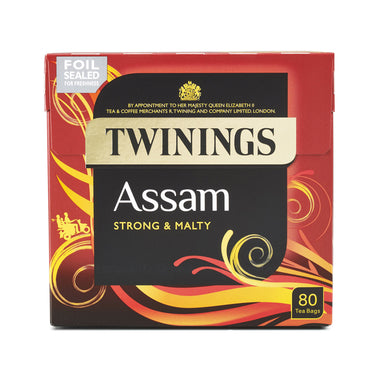Filter By:
Sort By:
Twinings Assam Tea
Assam tea is a tea grown in the Assam region of India. A black tea made from the Camellia sinensis plant, which is native to this part of India. It has a rich, full-bodied and malty flavour designed to leave you feeling refreshed and reinvigorated. Grown in Assam, the Northeast region of India, just south of the Himalayas, Assam tea is one of the most popular types of tea.
How Was Assam Tea First Discovered?
It is believed that Assam tea was first brought to Europe by Scottish adventurer Robert Bruce. Apparently, Bruce first noticed the tea plant growing in Assam and realised that local people were brewing and drinking the leaves of the plant. So Bruce decided to bring some of the leaves to Kolkata (formerly Calcutta), where it was discovered that the leaves were part of the Camellia sinensis plant.
The Assam region has three flushes, March to May/June, May/June to October and then a winter flush that runs from October to December, each producing a different characteristic. Discover more about the different types of flushes.
What Does Assam Tea Taste Like?
Described as having a bold aroma and a deep rich colour, Assam tea has a rich, malty and earthy taste. It is a strong tea that can be drunk with milk and sugar or sweeteners to help balance its flavour profile and enhance its natural sweetness. Assam tea is also one of the black tea varieties featured in English Breakfast tea.
What's The Difference Between Assam Tea and Darjeeling Tea?
Whilst Assam tea and Darjeeling are both types of black tea grown in India and have similar characteristics, they have quite distinct differences in flavour and aroma. Darjeeling has a lighter, more delicate flavour profile, whilst Assam tea is more robust and strong. Assam tea also is more earthy and malty in its aroma, whilst Darjeeling is more subtle. The way the two teas are picked is also different, with Assam tea usually harvested using the CTC (crush, tear, curl) method, and Darjeeling is often hand-picked and processed more traditionally.
Does Assam Tea Contain Caffeine?
Like all types of black tea, Assam tea naturally contains caffeine. This black tea comes from the Camellia sinensis plant and tends to contain higher levels of caffeine than green tea or white tea.
What Types of Assam Tea Are There?
With such a rich flavour profile, there are lots of delicious blends of Assam tea.
• Assam tea: A strong and satisfying cup of tea with a rich flavour profile.
• Loose Assam tea: A strong loose-leaf tea that is full-bodied with a lasting flavour.
• Nutty chocolate flavour Assam: A rich Assam loose-leaf tea with cocoa nibs and hazelnut flavouring.
• 2nd flush Assam TGFOP1: Appearing from May onwards, this is a rich, malty and lively tea.
How to Drink Assam Tea?
As with many varieties of tea, Assam tea can be enjoyed in different ways.
• As a loose-leaf tea - brewed to perfection.
• With added spices - Add some spices such as cardamon and cinnamon along with a bit of sugar to enjoy a twist on your Assam tea.
• With milk and sugar - To balance out its strength and rich flavour, add milk and sugar.
• Black - Without anything changing or altering its flavour.
Why Choose Twinings' Assam Tea?
Twinings have been blending tea for over 300 years, ensuring the best quality Assam tea.
• Exceptional quality: Our Master Blenders meticulously sample hundreds of teas worldwide to select the finest quality ingredients. We don't own any tea gardens, so we're free to partner with the best producers.
• Broad selection: Our broad selection of teas, including Assam tea, is tailored to introduce tea drinkers to new flavours and experiences. We've innovated since day one to introduce people to new tastes and experiences, including diverse black tea to our decaffeinated options.
• Preferred by tea drinkers: Our dedication to quality has made us the top choice for Out of Home Tea, with customers preferring our tea for its superior taste and quality.
• Committed to Sustainability: We are committed to sourcing teas with care and promoting the environmental and ethical treatment of our suppliers and pickers. Discover our commitment to communities.
Shop our Assam tea today and experience more. Got a question? Check our FAQs or contact us.




















